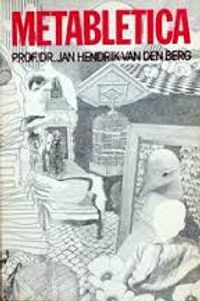welcome on my Website And Blog Kinebletica
My Website is Under Construction.
https://metabletica-jhvdberg.nl/index.html Kinebletica is founded on Metabletics-Theory of Changes- of Prof. Dr. Jan Hendrik van de Berg
https://nieuwemetabletica.nl It is also inspired by Ruud Hemel's "Nieuwe Metabletica
https://metabletica-jhvdberg.nl/
Kinebletica is a Concept what I build on the Foundation of J.H. van de Berg's Metabletica (1956)
Metabletica is a term introduced by psychiatrist Jan Hendrik van den Berg. In 1956 his book Metabletica or Doctrine of Changes was published. In it he argues that man has not been an unchanging fact in history, but that he actually changes over time. That is why our life is not 'a variation on a familiar theme' (namely the life that people used to live), but 'different, and essentially different'. Jan Hendrik van den Berg compares the Past and Present and asks about the meaning and meaning of the Diachronical and Synchronical Changes that have taken place. The wonderful thing is namely that these Changes became visible in many areas at the same time: the Family, Mathematics, Architecture, Spirituality, Physics, Psychology, Religion, Relationships between People, Art History, etc. .
Philosophical orientation
Van den Berg was a supporter and representative of Phenomenology, a Movement in Philosophy that takes the direct and intuitive experience of phenomena as its starting point. Its founder is Edmund Husserl. His Adagium louded: Zurück zur die Sachen Selbst." 'The doctrine was further developed by Maurice Merleau-Ponty and Martin Heidegger. 'Subjective' things such as 'movement' and 'enthusiasm' with regard to the 'research object' are very valuable and partly determine that 'subject object'.
So Van den Berg's most important contribution to Phenomenology is the Theory of Changes, which he baptized Metabletics. In various books he made surprising connections between disparate historical phenomena. He does this based on the assumption that Immanuel Kant was wrong: according to Van den Berg there is no such thing as a thing in itself; when man perceived the work of gods in nature, those gods actually existed, for man's perception of the world is the world. Another example is the unconscious: this is said to have only emerged in the course of the 19th century, so in the time of Sigmund Freud. This places him in the tradition of philosophical idealism or immaterialism, which can be characterized with the statement esse est percipi (to be is to be perceived), known by George Berkeley, among others.
The Metabletic Method consists in that simultaneously occurring phenomena, sometimes completely unrelated at first glance, are examined for relatedness and essential characteristics. By paying attention to these co-occurring phenomena in a phenomenological sense, the true nature of historical (or contemporary) developments can be brought to light. Together with H.C Rümke, M.J. Langeveld, F.J.J. Buytendijk and others, Van den Berg belonged to the 'Utrecht School' in psychiatry, a Phenomenologically oriented form of Psychiatry practice that was in vogue in Utrecht between 1945 and 1965.
Van den Berg had a great interest in cultural history, religious history and architecture. His interest in entomology (particularly the coleoptera) and botany deserves special mention.
Lorem ipsum dolor sit amet, consectetuer adipiscing elit. Aenean commodo ligula eget dolor. Aenean massa. Cum sociis natoque penatibus et magnis dis parturient montes, nascetur ridiculus mus. Donec quam felis, ultricies nec, pellentesque eu, pretium quis.
Lorem ipsum dolor sit amet
Lorem ipsum dolor sit
Lorem ipsum dolor sit amet, consectetuer adipiscing elit. Aenean commodo ligula eget dolor. Aenean massa.
Lorem ipsum dolor sit
Lorem ipsum dolor sit amet, consectetuer adipiscing elit. Aenean commodo ligula eget dolor. Aenean massa.
Lorem ipsum dolor sit
Lorem ipsum dolor sit amet, consectetuer adipiscing elit. Aenean commodo ligula eget dolor. Aenean massa.

